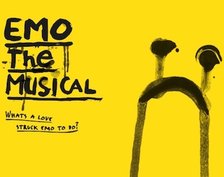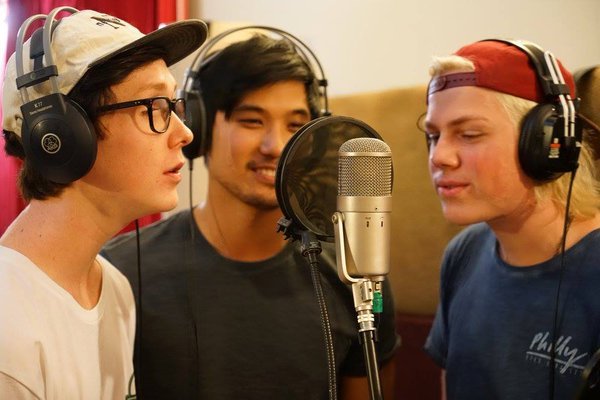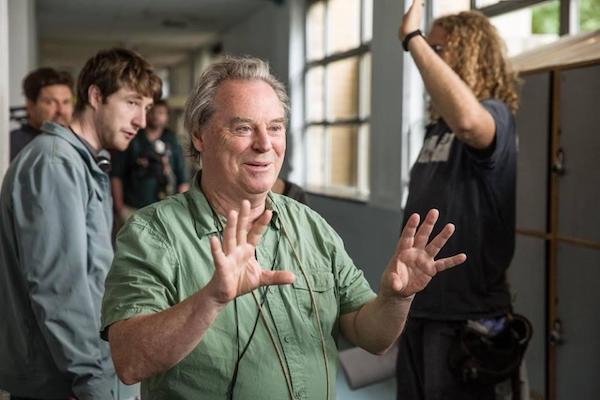 By Adam Ray Palmer Neil Triffett’s brilliant little film EMO the Musical premiered this week at the Berlinale in the Generation section (you can read our review on Cineroom now). I had got the chance to sit down and chat with director-writer Neil and the lead star Benson Jack Anthony about all things emo… and such. We talk musicals, school issues and Grease… ABOUT EMO THE MUSICAL: A sullen high-school student whose life is defined by what he hates finds love with a blindly optimistic Christian girl, much to the annoyance of his angst-filled band mates and her evangelistic brethren. THE INTERVIEW: ARP: Thank you for this interview both of you, how’s the Berlinale treating you? Have you both been here before? TRIFFETT: I have been here before. I loved it last time and I’ve loved it this time. There’s such a wonderful engagement with movies here, and our film has been really embraced. It’s also great to be screening in the Generations section, where the young audience are so smart and switched on. ANTHONY: Thank you. Berlinale is Wunderbar! This is my first time at the Berlinale and in Germany altogether, and it has already exceeded expectations. The energy surrounding the Berlinale is infectious toward the whole city, it is hard not to walk around with a smile on my face – despite the face freezing cold… ARP: This was your first feature film, Neil? Was there a huge difference from producing your short films? EMO was originally a short film wasn’t it? Was it difficult to make the transition to a 90-minute feature? TRIFFETT: I don’t think you can ever be prepared to make your first feature film. It’s unbelievably physically and mentally challenging. The infrastructure around a feature film is much harder to navigate and there are many more moving parts in a feature film story – we have about ten characters in the film who all have a journey, and being on top of all those stories was big. But it was a lot of fun and there were many laughs along the way. ARP: How did you get involved with the film Benson? What’s it like working with Neil? ANTHONY: Working with Neil was a pleasure and a learning curve for me. This was my first time working on a project with a Director-Writer. Having that 2-in-1 combination means the directions are much “clearer” and Neil’s needs for the characters are much more precise. Having to fit that mould of his original idea whilst also bringing my own flavour to the character was a great process. Also, as you may have guessed from the script, he is a very witty/quick guy so being on set was never dull. ARP: What was your inspiration for EMO the Musical, Neil? Sing Street rings a bell with EMO but they were made at a similar time I believe? It is also reminds me of an updated Grease – where Ethan and Trinity have their struggles to be together, plus, having their own set of rivalling friends. Was Grease an influence? TRIFFETT: We were inspired by many high-school movies like Mean Girls, Easy A, and Election. Grease was a film that we talked about because it does tackle a familiar Romeo and Juliet tale like we do, though we wanted to do something very different tonally and explore some very different issues. Sing Street is interesting, cause I didn’t see it until six months after filming Emo, but we were aware of the director’s other work, and we wanted to incorporate some of that approach to the musical into our film. Because there are two different groups in the film – Emos and Christians – they have two different approaches to the musical style; the Emos songs are more realism-based like Once or Sing Street, and they definitely don’t dance, but the Christians do randomly break songs like they do in La La Land, which is really fun. ARP: When the musical numbers arrive in the film, were they performed live or recorded in a studio and sung too? Why did you choose the method you went with? TRIFFETT: Our songs were pre-recorded and lip-synced to on set and a lot of effort went into making sure the syncing worked. We had the option of recording the singing on set, in a similar way to Les Miserables did a few years ago, but for us the heightened element of the songs was really important, and having the crisp, full sound of the recording studio really gave that too us. Having said that, as some of the songs in the film are an extension of the conversation that the characters are having, and because the songs are quite conversational in style, we worked really hard in the edit suite to mix the vocals so there was a gentle shift from the dialogue and space of the room into a full, glorious song, and there wasn’t a jarring shift between the two. ARP: It seems a great year for musical films, with La La Land set for Oscar glory, what’s your opinion on musical films? Are they making an acclaimed return with EMO, Sing Street and La La Land all from the past 12 months? I know I’d welcome more musical films! TRIFFETT: Musicals are great. They’ve been making a comeback for a while, I would say since Pitch Perfect, maybe even Once, both of which I really enjoyed. I enjoyed both Sing Street and La La Land but I think musicals are difficult to tackle in this day and age because people are cynical and expecting something new and exciting constantly from their films. There has to be something inherently musical about a story for it to become a musical, and I don’t think that lends itself to all films. So I hope to see more musicals, I just hope they give us something new and exciting about the musical form we haven’t seen before! ANTHONY: If great works keep being produced like they are now, I’m sure many people will welcome more musical films. ARP: What made you want to do a musical film in the beginning, Neil? Are they a challenge? For instance, writing the songs and music? Were the songs written after the narrative was complete? Or did they come naturally as you wrote scene after scene? TRIFFETT: It was a story I wanted to tell anyway, but the fact it was a musical made it feel really ambitious and challenging, making it more appealing. It almost seemed impossible to achieve, and who doesn’t want to do something they think is impossible? As far as writing the songs, the script and songs were written side-by-side, feeding into one another. ARP: EMO the musical has a lot of different individuals in it, what were you like at school, Neil? What group would you have assigned yourself to? TRIFFETT: I was a complete outsider. I went to a school in a rural community, where the option of which group to belong to was very limited, so I went for a long time thinking there was no one out there like me. When I went to College, and later university, I found a lot more people like me – arty kind of people – but I’m still a bit unsure if I’m fully one of them either. ARP: The film references a lot of different issues from faith, sex, self-harm and homosexuality and pregnancy (students in the library looking at books) … is this a nod to personal experiences with people from your past Neil? Or is it to show you shouldn’t hide your identity and that everyone is different? TRIFFETT: Though these aren’t personal experiences (with the exception of a few), they are an amalgamation of experiences of people I’ve known and met. I think everyone experiences pressures to fit in in many different ways, and we’ve been able to express that in many different forms in the movie. Hopefully this makes it more universal for audiences, as I’m sure there are a whole bunch of different struggles to fit in that we haven’t covered. ARP: Do you think EMO the Musical could be a live show, Neil? Whether it’s an actual musical or a tour of the songs? Would something like that be of interest? TRIFFETT: I like that it’s a film musical. It means there is something really pure about the narrative and the way the songs fit within that. It’s also a small musical, without dancing, and with a lot of the theatricality stripped back (we have one song performed in a cupboard!) So as a result I’d be a bit unsure about whether it could be transferred to stage. ARP: What’s next for you? Anymore films in the pipeline? TRIFFETT: I’m beginning development on a whole bunch of projects. It’s very tempting to make a film that might be perceived as more ‘serious’, but I love the fun EMO offers audiences. I’m developing a kids horror film that I’m the most excited about at the moment. ARP: Finally, what’s your favourite films? Or at least your top three? TRIFFETT: Harold and Maude by Hal Ashby is my favourite film. That would be followed by Election and the French film In the House. ANTHONY: Whiplash, Cyrus, Inglorious Bastards, anything with Alan Alda. Thank you both for your time, good luck at the Berlinale! Leave a Reply. |
Past
|



14/2/2017
0 Comments